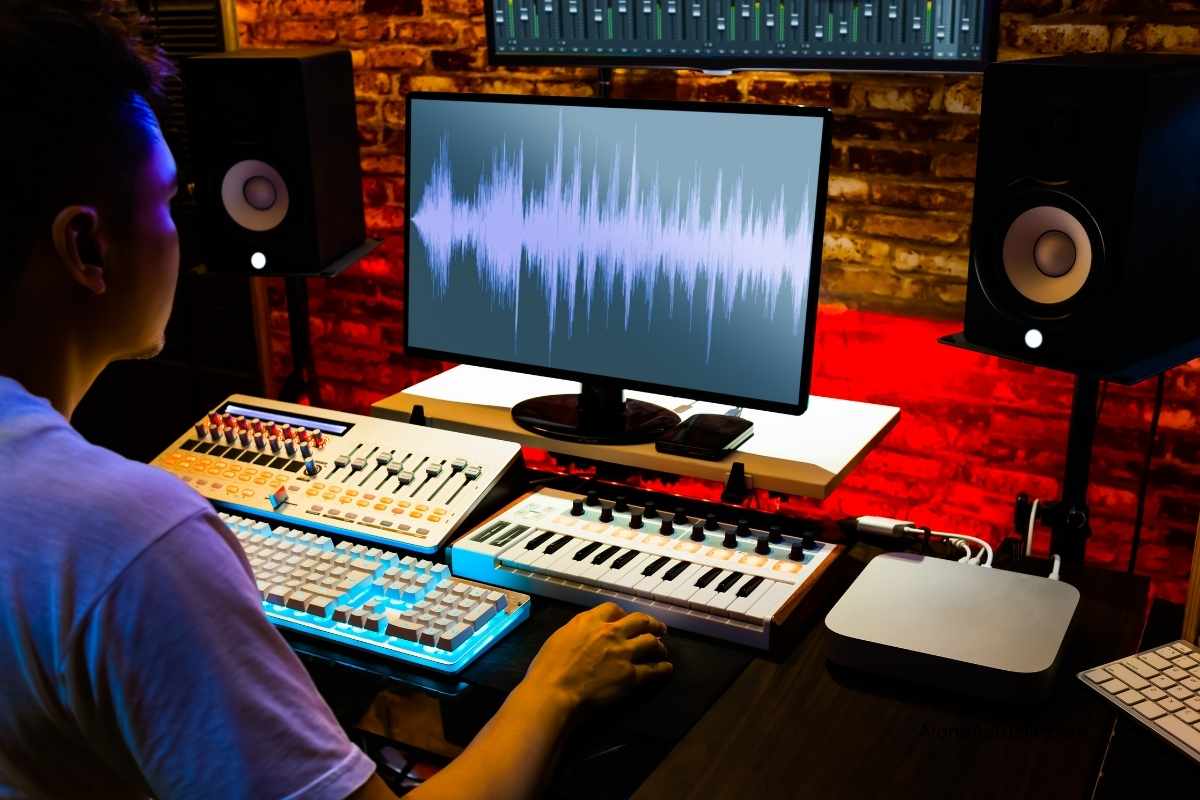31 Voice Editing Apps to Make You Sound Professional
Okay, be honest with me… have you ever recorded your voice and thought, “Wait… do I really sound like that?”
Yeah, me too.
It’s wild how different our voice can feel when we hear it back.
Sometimes it’s too flat, sometimes there’s this annoying background hum, and sometimes it just doesn’t have that “clean, clear, professional” touch we want.
That’s exactly why I started digging into voice editing apps.
Because the truth is, you don’t need a fancy studio or crazy-expensive gear anymore.
With the right app, you can take your regular voice recording and turn it into something crisp, smooth, and even kinda magical.
So here’s what I did — I pulled together 31 of the best voice editing apps I could find.
No outdated stuff, no “once-popular but now dead” apps. Just tools that actually work right now.
Some are simple enough for quick edits on your phone, others can handle serious projects like podcasts or music tracks.
If you’ve ever wanted your voice to sound just a little more polished (or let’s be real… a LOT more polished), this list is for you.
Let’s go through them one by one, and I promise — by the end, you’ll have your new favorite app sitting on your phone.
1. Audacity
If you’ve ever searched for a free voice editing tool, chances are you’ve already seen Audacity pop up.
And trust me, there’s a reason it’s still one of the most recommended apps out there.
Audacity is an open-source audio editor that works on Windows, Mac, and Linux, and it gives you pro-level features without costing a dime.
You can record directly into it, clean up background noise, cut or merge tracks, and add effects like echo, reverb, or pitch changes.
What I really like is that it doesn’t matter if you’re a beginner messing around with voice notes or someone editing a podcast — Audacity grows with you.
It might not look flashy, but it’s stable, powerful, and once you learn your way around, you’ll realize it can do almost everything the pricey apps can.
Also Read: 25 Best Music Editing Apps to Mix, Cut & Create Like a Pro
2. Adobe Audition
When people talk about professional voice editing, Adobe Audition almost always comes up.
This is the kind of tool you’ll find in radio stations, production studios, and with serious podcasters.
It’s part of the Adobe Creative Cloud, so you know it’s packed with features.
With Audition, you can record, cut, and layer multiple tracks, clean up background noise, fix pops or hisses, and even repair messed-up audio.
The best part is its precision — you get to zoom in so closely on your voice waveforms that you can polish every second of your recording.
It’s not free, and honestly, it can feel a bit overwhelming at first, but if you’re someone who really wants to take voice editing seriously, this is the powerhouse that delivers studio-quality results.
Also Read: 27 Best Editing Apps for Podcast Creators Right Now
3. WavePad Audio Editor
WavePad is one of those apps that surprises people because it balances being beginner-friendly with offering advanced tools.
You can use it to record your voice, trim and merge clips, and add fun effects like reverb, pitch shifting, or distortion.
But what makes it stand out is the extra features packed inside — things like spectral analysis (so you can literally see the sound frequencies), batch processing if you need to edit a bunch of files at once, and even voice-changing presets.
It works on Windows, Mac, iOS, and Android, which means you can edit on the go or on your desktop.
If you’re not ready for something as complex as Adobe Audition but you want more power than the simplest apps, WavePad is a really solid middle ground.
Also Read: 25 Music Apps Spotify Doesn’t Want You to Know About
4. Reaper
Now, if you’re looking for a professional-grade editor that doesn’t make your wallet cry, Reaper is the one you need to know.
It’s technically a full DAW (digital audio workstation), but don’t let that scare you off — it’s incredibly customizable and works beautifully for voice editing.
You can record unlimited tracks, use plugins to enhance or change your voice, and mix everything together with studio precision.
People love it because it’s lightweight, stable, and way cheaper than big names like Pro Tools or Logic.
There’s a free trial, and even when you buy it, the license is very affordable.
Yes, the interface looks a bit plain at first, but once you set it up the way you like, it becomes one of the most powerful tools you’ll ever use for voice and audio editing.
Also Read: 21 Free Music Apps for Unlimited Listening
5. Pro Tools
If there’s one name that screams industry standard, it’s Pro Tools.
This is the software most recording studios rely on, whether it’s for music, film, or professional voice work.
For voice editing, it’s a beast — you can clean up recordings, add effects, mix multiple tracks, and even do advanced mastering so your voice sounds ready for broadcast.
Now, here’s the thing: Pro Tools isn’t cheap, and the learning curve can feel steep if you’re just starting out.
But if you want to work at a professional level, this is the kind of tool that gives you everything.
Even better, they offer a free “Pro Tools Intro” version, which is a lighter but still powerful way to get started before committing to the full package.
Also Read: 31 Best Offline Music Apps to Listen Without Wi-Fi
6. Sound Forge
Sound Forge has been around for years, and it’s still one of the most trusted names in audio editing.
It’s especially popular with voice artists and music producers who want precision and speed.
What makes Sound Forge great is how easily it handles tasks like noise reduction, audio restoration, and detailed waveform editing.
If you’ve got an old voice recording that sounds fuzzy or crackly, this app can bring it back to life.
It also supports batch processing, so you can apply changes to a whole bunch of files in one go.
While it’s Windows-only, the depth of tools you get for cleaning, repairing, and polishing your voice makes it a favorite among people who take audio editing seriously.
7. Acoustica Standard Edition
Not everyone wants to spend a fortune on professional tools, and that’s where Acoustica Standard Edition shines.
It’s a budget-friendly editor that still feels surprisingly powerful.
With Acoustica, you can record your voice, cut and arrange clips, and add studio-level effects like EQ, compression, and reverb.
It also has built-in tools for repairing audio, so if your voice track has hiss, clicks, or background noise, you can clean it up without needing extra plugins.
The interface is sleek and beginner-friendly, which makes it perfect if you’re just starting to edit your voice but still want something more advanced than the free apps.
Think of it as the sweet spot between simplicity and professional quality.
8. Soundop
Soundop is one of those hidden gems that not everyone talks about, but once you try it, you’ll see why audio pros love it.
It’s designed for Windows and gives you everything you need for serious voice editing without feeling bloated.
You can work on multiple projects at once, apply effects in real time, and even do detailed audio restoration.
What I like most is how flexible it is — whether you’re cutting a podcast episode, cleaning up interviews, or adding a polished touch to voiceovers, Soundop handles it smoothly.
It also supports VST plugins, so you can expand it with extra tools whenever you need.
If you want a professional editor that’s powerful but not as intimidating as Pro Tools, Soundop is a solid choice.
9. Logic Pro X
For Mac users who want something beyond GarageBand, Logic Pro X is a dream come true.
It’s Apple’s professional-level DAW, and it’s packed with tools that can take your voice editing to the next level.
You can record high-quality vocals, use built-in pitch correction, layer effects, and even mix your voice with music tracks seamlessly.
The interface is polished (as you’d expect from Apple), and while it’s full of advanced features, it’s still intuitive enough that you won’t feel lost.
Many podcasters, singers, and voice artists stick with Logic because it balances power and ease of use so well.
It’s not free, but for the price, you get studio-grade software that will keep growing with you as your projects get bigger.
10. Soundtrap
If you’ve ever wished you could edit your voice from anywhere without being tied to one computer, Soundtrap is the answer.
It’s a browser-based editor owned by Spotify, and it lets you record, cut, and mix your voice right inside your web browser.
What makes it extra cool is the collaboration feature — you and a friend (or your whole team) can work on the same project in real time, kind of like Google Docs but for audio.
It also comes with built-in effects and instruments, so you can polish your voice or even add background music without downloading extra software.
Whether you’re a podcaster, student, or just someone experimenting with voice editing, Soundtrap makes the process easy and accessible.
11. AudioMass
If you don’t want to download anything and just need a quick, powerful way to edit your voice, AudioMass is a lifesaver.
It’s a completely free, browser-based audio editor that runs right in Chrome or any modern browser.
You can trim your recordings, cut out mistakes, adjust volume levels, and add effects like fade in/out, distortion, or reverb.
Since it’s open-source, there are no annoying ads or hidden fees.
The best part… You can literally open it up on any computer and start editing in seconds — no sign-up, no installs, just pure editing.
It’s not as feature-packed as pro software like Audition, but for quick and clean voice editing on the fly, AudioMass gets the job done beautifully.
12. Audio-Joiner.com
Sometimes you don’t need all the bells and whistles — you just want to combine a few voice clips into one clean file.
That’s exactly what Audio-Joiner.com is for.
It’s a super lightweight online tool that lets you merge multiple recordings in just a couple of clicks.
You can adjust the order, fade tracks in or out, and export the final result without downloading heavy software.
It’s perfect for people who do interviews, voiceovers, or even students putting together projects.
While it’s not designed for detailed editing like noise removal or effects, it’s hard to beat for speed and simplicity.
If you’re in a rush and need a no-fuss way to stitch your recordings together, this little tool is all you need.
13. GarageBand
If you’re an iPhone or Mac user, chances are you’ve already got GarageBand sitting on your device — and honestly, it’s one of the most underrated voice editing tools out there.
At first glance, people think it’s just for music, but it’s actually amazing for recording and editing vocals too.
You can cut and arrange tracks, add reverb or pitch correction, and even layer your voice with background music if you’re working on podcasts or creative projects.
The interface feels polished and user-friendly, making it a great starting point for beginners.
And the best part? It’s completely free.
If you want to make your voice sound professional without spending a cent, GarageBand is easily one of the best places to start.
14. FL Studio Mobile
If you’re serious about editing your voice on the go, FL Studio Mobile is a powerhouse.
It’s basically a full music studio packed into your phone or tablet, and while it’s known for music production, it’s also excellent for voice editing.
You can record vocals, clean them up, add studio effects like EQ, compression, or reverb, and then mix everything together with professional polish.
What makes it stand out is its multi-track setup — you can layer your voice with music, background sounds, or other recordings without missing a beat.
Plus, it works across iOS, Android, and even Windows, so you’re not tied to one device.
If you’ve ever wanted to carry a mini recording studio in your pocket, this is it.
15. WaveEditor
For Android users, WaveEditor is one of the best voice editing apps you can grab.
It’s simple enough for quick trims and recordings, but it also offers advanced features if you want to dig deeper.
You can cut, copy, and paste audio tracks, apply effects like reverb or distortion, and even work with multiple formats.
It also supports visual editing with spectrograms, which helps when you’re trying to fine-tune or clean up your voice.
What’s cool is that it feels light and fast, so you won’t get bogged down waiting for edits to process.
Whether you’re cleaning up a quick voice memo or working on something more serious, WaveEditor gives you solid tools without overcomplicating things.
16. Audio Editor – Free Music Editor
Don’t let the simple name fool you — Audio Editor – Free Music Editor is a surprisingly versatile app for Android that’s regularly updated.
It’s perfect for editing voice clips, creating ringtones, or polishing recordings for personal or professional use.
You can trim, merge, and mix audio files, add fade effects, and even convert between formats right inside the app.
It also has some fun extras like audio compression and volume boosting, which come in handy if your recordings sound too quiet or uneven.
Since it’s designed for quick editing, the interface is straightforward and easy to navigate, even if you’re new to audio editing.
If you want a no-cost, no-fuss tool that covers the basics really well, this one is worth installing.
17. Ferrite Recording Studio
If you’re into podcasting or long-form voice work on iOS, Ferrite Recording Studio is a gem.
It’s built specifically for spoken audio, so everything about it feels streamlined for recording and editing voices.
You can record straight into the app, highlight parts of the waveform, and cut or move sections around with simple gestures.
It also offers powerful tools like noise reduction, compression, and EQ if you want that polished, broadcast-quality sound.
What I really like is how it handles longer projects — it’s smooth even with hours of recordings, which a lot of mobile apps struggle with.
Whether you’re editing a podcast episode or voice notes for a project, Ferrite makes the process efficient and surprisingly enjoyable.
18. Descript
Descript is one of the most unique voice editing apps out there because it flips the process on its head.
Instead of cutting up waveforms, you edit your audio like you’re editing a Word document.
It automatically transcribes your voice, and when you delete or change words in the text, the audio updates to match.
That alone is a game-changer for podcasters and content creators.
But it doesn’t stop there — you also get tools for noise removal, multi-track editing, and even “Overdub,” which can generate your voice with AI to fix mistakes without re-recording.
It feels modern, efficient, and honestly makes editing less intimidating.
If you want to save hours of work while still getting pro-level results, Descript is worth trying.
19. Podcastle
If you’re just starting out with podcasting or voice projects, Podcastle is one of the most beginner-friendly options.
It’s an online editor that’s built around simplicity, so you don’t need to worry about steep learning curves.
You can record directly into it, clean up background noise, and apply effects to make your voice sound richer.
The app also comes with automatic transcription and AI tools to speed things up, which is a huge help if you’re repurposing content into articles or show notes.
What’s nice is that everything is cloud-based, so you can access your projects from anywhere.
For creators who want something easy, efficient, and tailored to spoken audio, Podcastle is a great place to start.
20. ElevenLabs
When it comes to AI voice tech, ElevenLabs is leading the pack.
It’s not just about editing your recordings — this tool can actually generate lifelike voiceovers that sound natural and human.
For creators, that means you can write a script and have it read back in a professional-sounding voice, or even clone your own voice to fix mistakes without re-recording.
It also supports multiple languages and accents, which makes it perfect if you’re creating content for different audiences.
While it’s more on the AI-generation side than traditional editing, the flexibility it gives you for narration, podcasts, and even YouTube voiceovers is huge.
If you’ve ever wanted to sound like a pro without a studio setup, ElevenLabs makes it happen.
21. Krisp
Background noise is one of the biggest killers of good voice recordings, and Krisp solves that in real time.
It uses AI to filter out distractions like keyboard clicks, fan noise, or traffic, leaving your voice clear and professional.
What makes Krisp special is that it works live — so you can use it during calls, live streams, or recordings without waiting for post-production.
It also comes with features like echo cancellation and even automatic transcription, making it more than just a noise remover.
If you’re recording in less-than-perfect spaces (like a home office or a café), Krisp can instantly upgrade your sound quality.
Think of it as your invisible soundproof booth that fits right on your computer.
22. Speechify
At first glance, Speechify is known as a text-to-speech tool, but it’s also surprisingly handy for creators who need polished voiceovers.
You can type or paste your script, and Speechify will read it out in a natural, customizable voice.
You can tweak the speed, tone, and style to fit your project — whether it’s for a YouTube video, a presentation, or an audiobook.
The voices sound far less robotic than older TTS apps, which makes them great for professional use.
On top of that, Speechify works across platforms, so you can start something on your laptop and finish it on your phone.
If recording your own voice feels intimidating, or you just want variety, Speechify gives you an instant, high-quality alternative.
23. HitPaw Voice Changer
If you want to have a little fun while still keeping things professional, HitPaw Voice Changer is a great pick.
It works in real time, meaning you can change your voice while recording, streaming, or even during calls.
You’ll find tons of presets here — everything from cartoonish effects to celebrity-like voices, and even more serious options that can deepen or brighten your natural tone.
It also has built-in audio editing tools, so you can clean up and polish your recordings after you’ve applied effects.
While it’s definitely popular with gamers and streamers, it’s also handy for content creators who want to add a unique twist to their projects.
If you’re looking to stand out or just play around with how your voice sounds, HitPaw makes it super easy.
24. Fiverr
Now, this one’s a little different — Fiverr isn’t an app for editing your own voice, but it gives you access to professionals who can.
If you’ve got an important podcast episode, a song demo, or even a presentation that needs to sound flawless, hiring an editor on Fiverr can save you hours.
Many audio editors on the platform use high-end software like Pro Tools or Adobe Audition, so you get studio-level results without needing to learn the tools yourself.
You can pick someone based on reviews, budget, and turnaround time, making it flexible for any project.
Think of Fiverr as your backup plan when you want your voice to sound its absolute best but don’t have the time (or patience) to do all the edits on your own.
25. Elgato Wave Link 2.0
If you’re into streaming or live content, Elgato Wave Link 2.0 is a must-know tool.
It’s designed to work with Elgato microphones, but even beyond that, it’s a powerful voice control app.
You can manage multiple audio sources at once — like your mic, game sound, music, and effects — and balance them in real time.
What really makes it stand out is the built-in noise suppression and voice enhancement, which helps your voice cut through even in noisy environments.
Streamers love it because you don’t need to juggle multiple apps — everything sits neatly in one place.
If you want clear, broadcast-quality voice for live streaming, video calls, or recordings, Elgato Wave Link feels like having a mini control studio right on your computer.
26. DaVinci Resolve (Fairlight)
Most people know DaVinci Resolve as a video editing powerhouse, but its Fairlight audio page is a secret weapon for voice editing.
Fairlight is a full audio production suite built right inside Resolve, so you can record, clean, and mix your voice without leaving the app.
It gives you tools like noise reduction, EQ, dynamics, and even 3D audio if you want to get fancy.
The cool part is that it works seamlessly with video, making it perfect for YouTubers, filmmakers, or anyone who needs polished voiceovers with visuals.
And here’s the kicker — the free version of DaVinci Resolve already includes Fairlight, so you’re getting pro-level voice tools without paying a dime.
If you want one app that covers both video and audio, this is hard to beat.
27. Audiate
Audiate is another transcription-based editor, and it feels a lot like Descript’s cousin.
Instead of struggling with waveforms, you edit your voice recording by editing the text transcript.
Delete a word in the text? Boom, it’s gone from the audio.
That makes it super handy for cleaning up mistakes, filler words, or long pauses without manually scrubbing through audio.
It also has features like automatic transcription, voice cleanup, and easy exporting, so you can quickly polish your recordings for podcasts, tutorials, or online courses.
While it’s aimed at professionals, the workflow is simple enough for beginners to pick up quickly.
If you hate the old-school way of editing audio, Audiate turns the process into something almost effortless.
28. Riverside.fm
If you’ve ever tried recording a podcast remotely, you know how frustrating laggy or poor-quality audio can be.
Riverside.fm solves that by recording each person’s audio locally on their device, then uploading the high-quality files to the cloud.
That means your final voice tracks sound crisp and studio-like, even if the call itself was glitchy.
Once recorded, Riverside also gives you built-in editing tools to trim, clean, and polish the audio before publishing.
It’s become a favorite for podcasters, interviewers, and even YouTubers who need reliable remote recording.
The fact that it runs in the browser and doesn’t require a complicated setup makes it even better.
If collaboration and quality matter, Riverside.fm is a game-changer.
29. Ableton Live
While Ableton Live is best known as a music production tool, it’s also a fantastic option for voice editing.
The interface is sleek and modern, and it gives you deep control over your recordings.
You can cut and rearrange voice clips, apply effects like EQ or compression, and even use its powerful pitch correction to fix vocals.
What makes Ableton stand out is its creative workflow — it’s not just about cleaning up your voice, but also about experimenting with how it sounds.
Many artists use it to layer vocals, add unique textures, or blend voice with music.
If you’re a creator who loves both music and voice projects, Ableton Live feels like a playground where you can polish your recordings and get creative at the same time.
30. MP3Cut.net
If you’re after something quick and super simple, MP3Cut.net is a handy online tool worth bookmarking.
It’s perfect for those moments when you just need to trim or cut a voice recording without downloading heavy software.
You upload your file, drag the sliders to select the part you want, and export it in seconds.
It also supports fade-in and fade-out effects, which give your recordings a smoother, more professional feel.
While it’s not going to replace a full editor like Audition or Reaper, MP3Cut is perfect for small, on-the-go tasks — like creating ringtones, clipping voiceovers, or cutting down long recordings.
Sometimes, less really is more, and MP3Cut proves that quick edits don’t have to be complicated.
31. Shotcut
Shotcut is technically a video editor, but don’t let that fool you — it’s also a capable tool for editing voice recordings.
Since it’s open-source and free, it’s a great entry point if you want solid editing without a price tag.
You can record or import your audio, clean it up with filters like noise reduction or EQ, and sync it with video if you’re making content for YouTube or presentations.
The interface isn’t the prettiest, and it takes a little time to get used to, but once you do, it’s surprisingly powerful.
For anyone who wants both video and voice editing in one package without spending a cent, Shotcut is a reliable option that continues to get regular updates.
My Final Take
Look, there’s no “one-size-fits-all” when it comes to voice editing apps.
Some of you might just need something quick and easy, like AudioMass or MP3Cut, to clean up a voice note.
Others might be looking for studio-level control with Adobe Audition, Pro Tools, or Reaper.
And if you’re curious about what AI can do, tools like Descript, ElevenLabs, and Krisp open up a whole new way of working with your voice.
The good news… Every single app on this list can help you sound more polished — whether you’re recording a podcast, editing YouTube videos, or just making sure your voice memo doesn’t sound like it was recorded in a tunnel.
If you’re not sure where to start, pick one that matches your vibe and play around with it.
You’ll be surprised at how much better your voice can sound with just a few tweaks.
And who knows — once you find “your app,” you might even start loving the sound of your own voice.





